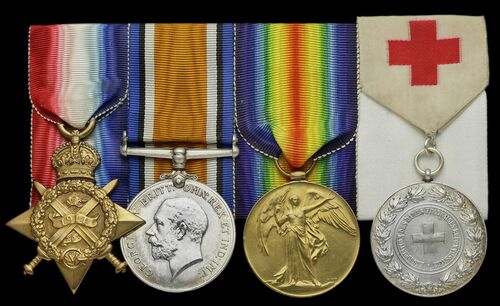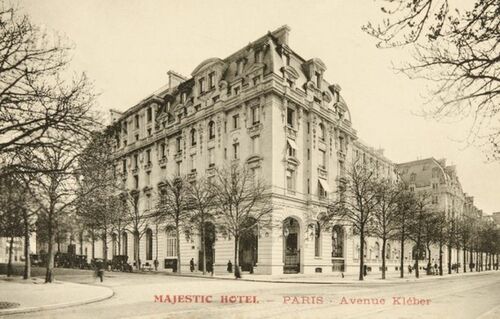Auction: 23001 - Orders, Decorations and Medals
Lot: 104
A rare Great War campaign group of four awarded to Sister Edith E. Cherriman, Haden Guest Unit and French Red Cross
1914 Star (E. E. Cherriman, Haden Guest Unit); British War and Victory Medals (E. E. Cherriman); France, Third Republic, Red Cross Medal, silver, unnamed as issued, nearly extremely fine (4)
Edith E. Cherriman was born in Ditchling, Sussex, 28 January 1897 and served during the Great War as member of the Haden Guest Unit, in 1914, prior to undertaking further duties with the French Red Cross.
Her unit had been founded by Leslie Haden-Guest, M.C. (1877-1960), afterwards the 1st Baron Haden-Guest, a medical officer and Boer War veteran, who devoted himself to establishing new hospitals in France. He was also the founder of the Anglo-French Committee of the Red Cross.
Haden Guest Unit 1914
Cherriman is recorded as having arrived in France on 5 September 1914 and she was quickly deployed to the Hotel Majestic in Paris.
The hotel had recently been purchased by the British barrister and politician Henry Devenish Harben (1874-1967), his aim being to establish a hospital for the treatment of military wounded. Some accounts state that parts of the building remained in use as a hotel and that there emerged considerable friction between the medics and the hotel staff. Either way, Haden-Guest and his team found themselves operating under considerable stress, as evidenced by the following extract taken from For Dauntless France, by Laurence Binyon:
'Already an English hospital had been opened at The Hotel Majestic in Paris, with some hundred beds, and a highly efficient staff. This was the first fruits of the enterprise of an English doctor, who on the eve of England's declaration of war had decided, should war break out, that he would devote himself to the organisation of hospitals for the wounded in France. Early in August he was in Paris, making plans in consultation with the French Red Cross, and returning to London got together his first unit finally installed in the Majestic.
Those were nightmare times. Here was a country suddenly called to fight for its life and to care for its wounded at the same time, when all ordinary conditions were dislocated, the traffic on the railways deranged and congested, accommodation of every kind inadequate to the fearful pressure of the moment, the resources of the medical service strained beyond all conception.
Men would often be nine days in the train before proper surgical help could be given them. French, English, Belgian, and German wounded were brought indiscriminately to the Majestic; and the head surgeon would frequently operate on five or six cases during the night after twenty operations in the day.
On one day, the founder of the hospital came upon nearly two hundred badly wounded men, lying for the moment with no medical service nearby. He brought as many as could be spared from the staff of the Majestic; for three days and a half continuously they worked to save these men; many they brought at last to Paris on barges. But by December Paris was fully provided with hospitals, and it was thought desirable to set to work elsewhere. The Majestic was therefore closed in January [1915].'
Details of Cherriman's subsequent services with the French Red Cross remain unknown but it is known she was back in the U.K. in September 1917, when she married Norman Charlish.
She died, aged 92, in Brighton, Sussex in July 1989.
Postscript
Today, the refurbished Hotel Majestic has been renamed the Peninsula, the building's elegant reception rooms retaining splendid Edwardian features undoubtedly known to Edith Cherriman.
Over the years, the hotel has played host to such luminaries as Marcel Proust, Igor Stravinsky, Pablo Picasso and George Gershwin, who wrote An American in Paris while staying there in 1928.
So, too, to the German forces of occupation from October 1940, although it is interesting to note that General Carl-Heinrich von Stulpnagel used his time there in his second-floor office to plan Hitler's assassination, liaising with Colonel Claus von Stauffenberg. On the day of the July plot in 1944, he ordered the arrest of all Gestapo and S.S. officers in Paris but ultimately, in common with Stauffenberg, met a terrible fate.
For her miniature dress medals, please see Lot 481A.
Subject to 20% VAT on Buyer’s Premium. For more information please view Terms and Conditions for Buyers.
Sold for
£650
Starting price
£420









